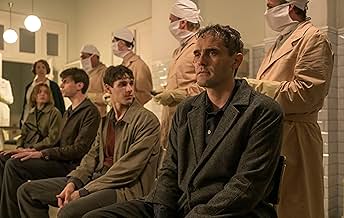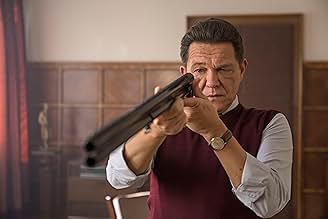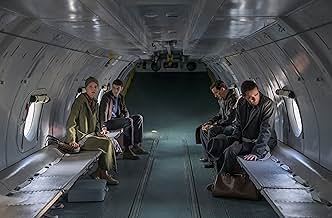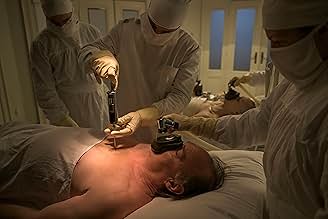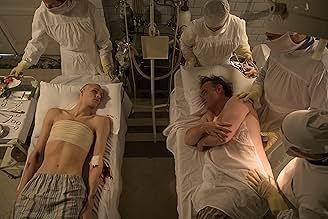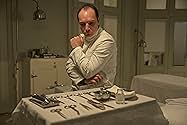Cuvari formule
- 2023
- 2h
ÉVALUATION IMDb
8,1/10
4,2 k
MA NOTE
Ajouter une intrigue dans votre langueIn 1958, during the Cold War, two scientists, two worlds, and two ideologies faced a race for survival at the Vinca Scientific Institute near Belgrade.In 1958, during the Cold War, two scientists, two worlds, and two ideologies faced a race for survival at the Vinca Scientific Institute near Belgrade.In 1958, during the Cold War, two scientists, two worlds, and two ideologies faced a race for survival at the Vinca Scientific Institute near Belgrade.
- Prix
- 33 victoires et 26 nominations au total
Avis en vedette
"Guardians of the Formula," directed by Dragan Bjelogrlic, is a compelling cinematic feat that skillfully brings to life the gripping tale of the 1958 Vincha Institute nuclear accident. Bjelogrlic, alongside a stellar cast including Alexis Manenti and Radivoje Bukvic, delves into this poignant historical moment with finesse and depth. The actors deliver powerful performances, embodying their characters' struggles and triumphs with authenticity. The production quality of the film is commendable, seamlessly blending historical accuracy with narrative emotion, making it a passionate tribute to a critical scientific milestone and the indomitable human spirit.
This movie based in true story, accident on secret Yugoslav nuclear reactor, will take you on emotional rollercoaster following a drama of young Yugoslav/Serbian nuclear scientists, French doctors and group of just ordinary local French people.
Even dough story pivots around an accident during a Yugoslav top secret A-bomb/nuclear weapons project it's an actually a drama about humans, their friendship, sacrifice, compassion, greed, pride and power.
Supporting role actors - they win this show for me. Local French people like Odet and car mechanic, deliver direct emotions in small amount of screen time.
Two young actors in rolls of Yugoslav scientists/students, Zivota and Radojko, put up an amazing act as they manage to convince you in real life chemistry of the two best friends. Their banter and quarrelling, depict a true image of Serbian culture of friendship and humor. Guys did a hell of the job.
Other supporting acts of Rosa, Vera are very good and convincing.
Main actors, French and Yugoslav professors, put up a needed level of act. I have a feeling there was much more to give from their side. Especially from the Yugoslav professor Dragoslav. But this is where we come to screenplay and its limitations hindering main character development.
Screenplay introduces some unnecessary stereotypes common in western cinematography, regarding communist countries in general.
This fails in case of Yugoslavia, as it renders the characters of Professor Dragoslav Popovic, Professor Savic and politician Rankovic as Soviet style communists/clerks. That's far from the truth, and takes important traits of main Yugoslav character.
Bit of history:
In real life professor Savic and politician Rankovic took a heroic and important part in WWII as one of the leaders of Yugoslav partisan resistance - the greatest and the most effective anti Nazi resistance in whole of Europe!
At the start of WWII prof. Savic as a one of the Nobel prize candidates for discovering nuclear fission (foundation principle of A bomb) will return from Paris to Yugoslavia to fight Nazis along with his sister in ranks of partisan resistance. Imagine the heroism. Nazis will murder his sister.
Politican Rankovic will lead anti nazi resistance forces, getting his wife murdered by nazis, himself tortured by Gestapo.
These guys know each other. Coming out victorious from the hell of WWII, with the goal to create Yugoslavia as strong and independent from East and West.
Keeping independence in Cold War easily leads to idea of developing A-bomb.
Prof. Savic will advocate a local Yugoslav nuclear program independent from the east and the west. Prof. Savic will be the one helping Rankovic to send injured scientists to Paris, using his French connections.
There comes professor Dragoslav Popovic, as a wonderkid promoted by Prof. Savic, a genius with ground breaking ideas how to produce plutonium from local Yugoslav ores, needed for A-bomb. Dragoslav, works in romantic era, Yugoslavia is driven by its own epic anti nazi WWII victories securing it unique place in Europe, separate to West and East. Translates to endangered by East and West. People dream of securing Yugoslavia's peace.
Have in mind this is the time when the France - todays only nuclear power in EU, was struggling to come up with technology to create A-bomb. France was secretly working on their A bomb in cooperation with Israel and Jewish scientists from the Manhattan project.
Yugoslavia was war wracked, small, poor nation, destroyed by Nazi genocide of Serbs, Jews and Roma, but still had know-how to enter the race with US, Soviets, France... Quite amazing, right! But it took tolls.
Most of scientists working on the first Yugoslav nuclear reactor were just the kids, students and graduate's. Some of them were passing their undergraduate English exams on control panels of reactor before the accident. New technology, scarce funding, it ended up with accident. Followed by pressure from both West and East to kill Yugoslav a-bomb research, research was stopped.
Even dough story pivots around an accident during a Yugoslav top secret A-bomb/nuclear weapons project it's an actually a drama about humans, their friendship, sacrifice, compassion, greed, pride and power.
Supporting role actors - they win this show for me. Local French people like Odet and car mechanic, deliver direct emotions in small amount of screen time.
Two young actors in rolls of Yugoslav scientists/students, Zivota and Radojko, put up an amazing act as they manage to convince you in real life chemistry of the two best friends. Their banter and quarrelling, depict a true image of Serbian culture of friendship and humor. Guys did a hell of the job.
Other supporting acts of Rosa, Vera are very good and convincing.
Main actors, French and Yugoslav professors, put up a needed level of act. I have a feeling there was much more to give from their side. Especially from the Yugoslav professor Dragoslav. But this is where we come to screenplay and its limitations hindering main character development.
Screenplay introduces some unnecessary stereotypes common in western cinematography, regarding communist countries in general.
This fails in case of Yugoslavia, as it renders the characters of Professor Dragoslav Popovic, Professor Savic and politician Rankovic as Soviet style communists/clerks. That's far from the truth, and takes important traits of main Yugoslav character.
Bit of history:
In real life professor Savic and politician Rankovic took a heroic and important part in WWII as one of the leaders of Yugoslav partisan resistance - the greatest and the most effective anti Nazi resistance in whole of Europe!
At the start of WWII prof. Savic as a one of the Nobel prize candidates for discovering nuclear fission (foundation principle of A bomb) will return from Paris to Yugoslavia to fight Nazis along with his sister in ranks of partisan resistance. Imagine the heroism. Nazis will murder his sister.
Politican Rankovic will lead anti nazi resistance forces, getting his wife murdered by nazis, himself tortured by Gestapo.
These guys know each other. Coming out victorious from the hell of WWII, with the goal to create Yugoslavia as strong and independent from East and West.
Keeping independence in Cold War easily leads to idea of developing A-bomb.
Prof. Savic will advocate a local Yugoslav nuclear program independent from the east and the west. Prof. Savic will be the one helping Rankovic to send injured scientists to Paris, using his French connections.
There comes professor Dragoslav Popovic, as a wonderkid promoted by Prof. Savic, a genius with ground breaking ideas how to produce plutonium from local Yugoslav ores, needed for A-bomb. Dragoslav, works in romantic era, Yugoslavia is driven by its own epic anti nazi WWII victories securing it unique place in Europe, separate to West and East. Translates to endangered by East and West. People dream of securing Yugoslavia's peace.
Have in mind this is the time when the France - todays only nuclear power in EU, was struggling to come up with technology to create A-bomb. France was secretly working on their A bomb in cooperation with Israel and Jewish scientists from the Manhattan project.
Yugoslavia was war wracked, small, poor nation, destroyed by Nazi genocide of Serbs, Jews and Roma, but still had know-how to enter the race with US, Soviets, France... Quite amazing, right! But it took tolls.
Most of scientists working on the first Yugoslav nuclear reactor were just the kids, students and graduate's. Some of them were passing their undergraduate English exams on control panels of reactor before the accident. New technology, scarce funding, it ended up with accident. Followed by pressure from both West and East to kill Yugoslav a-bomb research, research was stopped.
I saw this film at the Palm Springs Film Festival this past January. For this showing, I felt a palpable tension in the audience during the entire two-hour length of the film.
The movie focused on historical events of which I was completely unaware. A nuclear disaster in Yugoslavia leads to infected lab workers being transported to France to undergo experimental treatments - the first transplant of non-related bone marrow .
The acting, direction, and writing in this film are top-notch. In fact, it was, in my view, far better than any of this year's Oscar-nominated films and the most intriguing movie I've seen in years. It is befuddling that this site's user reviews of this film are either exceptionally good or exceptionally bad. Were we watching the same film?
I would really like to have the opportunity to see Guardians of the Formula again to confirm my first impression of this film, but I've been looking for it since January to no avail. Why isn't this film available in the U. S. on Netflix or some other streaming service?
The movie focused on historical events of which I was completely unaware. A nuclear disaster in Yugoslavia leads to infected lab workers being transported to France to undergo experimental treatments - the first transplant of non-related bone marrow .
The acting, direction, and writing in this film are top-notch. In fact, it was, in my view, far better than any of this year's Oscar-nominated films and the most intriguing movie I've seen in years. It is befuddling that this site's user reviews of this film are either exceptionally good or exceptionally bad. Were we watching the same film?
I would really like to have the opportunity to see Guardians of the Formula again to confirm my first impression of this film, but I've been looking for it since January to no avail. Why isn't this film available in the U. S. on Netflix or some other streaming service?
Bjelogrlic really out-done himself with this movie. Based on the book "Vinca case" and a real event that occured less than a century ago, the plot captures an intense story of both trying to build an atomic bomb in ex Yugoslavia and curing the scientists from all the radiation caused by it.
Some of the scenes were to agonizing to watch, so it is not a movie for everyone. The protagonist has a dual personality, where we both understand (pitty) him and hate him and blame him for all the mess. Nevertheless it leads you through happiness, pain, anger, sadness, disbelief and many other emotions but for sure will not leave you numb.
I think that this story of the first bone marrow transplant was an important one to be told to honour Georges Mathé and his astonishing work that helped many. Apart from that I really liked the idea of the subtitle "Chain reaction" which fluctuated through the film and practically explains The butterfly effect and the overall consequence of every small action.
Some of the scenes that show kindness and joy in people in the hardest situations made the whole movie so special.
Overall the acting is impeccable, and the plot, as I mentioned, is so touching and one of the best pieces I have seen for a long time.
Some of the scenes were to agonizing to watch, so it is not a movie for everyone. The protagonist has a dual personality, where we both understand (pitty) him and hate him and blame him for all the mess. Nevertheless it leads you through happiness, pain, anger, sadness, disbelief and many other emotions but for sure will not leave you numb.
I think that this story of the first bone marrow transplant was an important one to be told to honour Georges Mathé and his astonishing work that helped many. Apart from that I really liked the idea of the subtitle "Chain reaction" which fluctuated through the film and practically explains The butterfly effect and the overall consequence of every small action.
Some of the scenes that show kindness and joy in people in the hardest situations made the whole movie so special.
Overall the acting is impeccable, and the plot, as I mentioned, is so touching and one of the best pieces I have seen for a long time.
Saw this at the Movies That Matter 2024 filmfestival in The Hague. Insightful story about dilemma's faced by scientists, who want to forward not only science but also (and maybe foremost) their own careers, sometimes at the expense of everyone and everything. We see their interactions with politicians they need for their budget and to obtain material that is difficult to come by. Similarly, we see encounters with the secret service wanting to know all about their progress and what purpose it can serve, not always for the best of mankind, but they have leverage to get what they want to know, or to steer the project in the direction they prefer.
We see relevant issues in this context from two scientists, one behind the iron curtain and one on our side whose lives become entangled by (literally) accident. They both conclude that their encounter has a purpose. They delve deep in their motives and their conscience, equally relevant in both their respective research fields. In one of the final scenes we see a butterfly appear, not having a specific role, but carrying a hint towards us viewers that a minor flapping of a butterfly's wing can cause an avalanche or a tornado elsewhere in the world (butterfly and avalanche, both famous from chaos theory).
Neglecting family relationships is a particularly nasty habit of scientists. Our main protagonist even misses the birth of his first child. Later, when he is congratulated with the happy event, he does not even know whether it was a boy or a girl.
Even worse are their interactions with staff and others around. In contemporary terms: an unsafe work environment. With our 21st century eyes we consider their manners dubious, to say the least. We know that such norms have shifted considerably since 1958 but are also aware it still does not apply everywhere. An example from this film: firing someone in the middle of a crucial experiment when she did not address the project leader with his proper title, is not only counterproductive but is fatal in destroying a sound and safe work environment where every opinion and every employee counts.
All in all, an enlightening story in many aspects. The ancient environment anno 1958 seems to be rebuilt very well (I was 10 at the time, so my memory may fail on details). Strong and believable protagonists, each giving insight in what they want to achieve, though their ways of getting things done are not always the finest examples of pure science for the benefit of humanity. I scored a 5 out of 5 for the audience award when leaving the venue.
We see relevant issues in this context from two scientists, one behind the iron curtain and one on our side whose lives become entangled by (literally) accident. They both conclude that their encounter has a purpose. They delve deep in their motives and their conscience, equally relevant in both their respective research fields. In one of the final scenes we see a butterfly appear, not having a specific role, but carrying a hint towards us viewers that a minor flapping of a butterfly's wing can cause an avalanche or a tornado elsewhere in the world (butterfly and avalanche, both famous from chaos theory).
Neglecting family relationships is a particularly nasty habit of scientists. Our main protagonist even misses the birth of his first child. Later, when he is congratulated with the happy event, he does not even know whether it was a boy or a girl.
Even worse are their interactions with staff and others around. In contemporary terms: an unsafe work environment. With our 21st century eyes we consider their manners dubious, to say the least. We know that such norms have shifted considerably since 1958 but are also aware it still does not apply everywhere. An example from this film: firing someone in the middle of a crucial experiment when she did not address the project leader with his proper title, is not only counterproductive but is fatal in destroying a sound and safe work environment where every opinion and every employee counts.
All in all, an enlightening story in many aspects. The ancient environment anno 1958 seems to be rebuilt very well (I was 10 at the time, so my memory may fail on details). Strong and believable protagonists, each giving insight in what they want to achieve, though their ways of getting things done are not always the finest examples of pure science for the benefit of humanity. I scored a 5 out of 5 for the audience award when leaving the venue.
Le saviez-vous
- AnecdotesBased on a true story.
- GaffesScientist Dragoslav Popovic wasn't actually irradiated during the Vinca accident. In the film he is the main character among the irradiated scientists.
- Autres versionsThe final film has an international version with French titles and a regional version with Serbian titles.
- ConnexionsReferences Ozraceni (1976)
- Bandes originalesCamac na Tisi
written by Darko Kraljic, Dusan Jaksic
performed by Dusan Jaksic, Olivera Markovic
published by Jugoton
Meilleurs choix
Connectez-vous pour évaluer et surveiller les recommandations personnalisées
- How long is Guardians of the Formula?Propulsé par Alexa
Détails
- Date de sortie
- Pays d’origine
- Sites officiels
- Langues
- Aussi connu sous le nom de
- Guardians of the Formula
- Lieux de tournage
- sociétés de production
- Consultez plus de crédits d'entreprise sur IMDbPro
Box-office
- Brut – à l'échelle mondiale
- 1 496 065 $ US
- Durée2 heures
- Couleur
- Rapport de forme
- 16:9 HD
- 2.4 : 1
Contribuer à cette page
Suggérer une modification ou ajouter du contenu manquant

Lacune principale
What is the Brazilian Portuguese language plot outline for Cuvari formule (2023)?
Répondre

